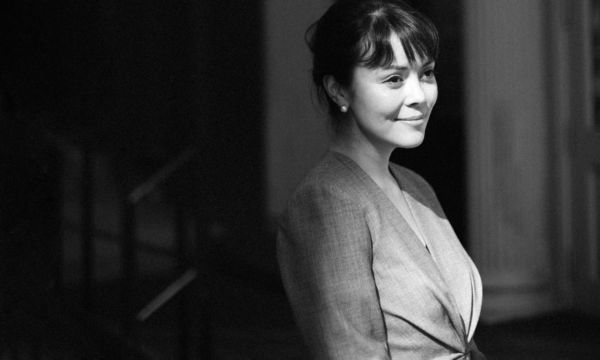
Shop This Look
Meet Sarah LaFleur’s Girl Crush, Ambassador Samantha Power
M.M.LaFleur’s CEO, Sarah LaFleur, sits down with her muse, Ambassador Samantha Power, for a one-on-one chat about what it means to be a multifaceted, complex woman.
When I arrived on campus as a college freshman, the real Samantha Power (or Professor Power, as she was known back then) had just won a Pulitzer Prize for her book, A Problem from Hell. This book was critical of America’s passivism in many of the world’s atrocities in the 20th century, from the Armenian genocide to the war in Kosovo. In a nutshell: “We say ‘never again,’ but do the American government’s actions actually reflect that belief?” As someone who dreamed of working at a refugee camp—and maybe, one day, the United Nations—she was everything I wanted to be. She was passionate. She was intelligent. In person, she had a calm, low voice that commanded the attention of the entire room. And, of course, in true girl-crush fashion, she was gorgeous. She had long, red hair that she mostly wore down, and she wore minimal (or no?) make-up that made her look like a Neutrogena model.

My admiration has been mostly from afar, but after 18 years of stalking admiring, I finally had the opportunity to interview her at her home in Concord, MA (on the map for being the hometown of the March family in Little Women), just an hour or so from her current posting as a joint professor at Harvard’s Kennedy and Law Schools. During our two-hour interview, she was simultaneously dealing with her children’s bus schedules and making sure that her daughter left on time for soccer practice, all while fielding calls from work and family—in addition to questions from me. There were two adorable labs barking in the background, wondering why there were a dozen strangers in their home, and she stopped for a moment to give them a reassuring head rub. As I watched her multitask, I was reminded that she is in fact, like many other working moms. Sure, it might have been a political leader on the other line, but if you can put aside names for a moment, her life appears equal parts fulfilling and chaotic, like many of ours. “Pulitzer Prize-winning former advisors to President Obama: They’re just like us!”
Just in case you haven’t been obsessed with Amb. Power for years like I have, here’s some (very quick) background: She came to the U.S. from Ireland as a child with her mother and younger brother. The young Amb. Power was a real tomboy who loved track, baseball, and basketball. She headed off to Yale for undergrad, and from there, became a war correspondent in the Balkans for three years before attending Harvard for her law degree.
Want more M Dash?
Sign up for our weekly newsletter.
Thank you!
After graduating, she landed a job teaching at Harvard. Fast forward a couple of years, when she met a junior senator from Illinois named Barack Obama and decided (on a whim, really) to join his team as a foreign policy fellow. A presidential campaign and election ensued. In 2008, she joined the White House as Special Assistant to the President, and eventually became the U.S. Ambassador to the United Nations. Her most recent book, The Education of an Idealist, is a memoir chronicling her life before, during, and after her time at the White House.
This book is an interesting read for anyone interested in a behind-the-scenes look at foreign policy during the Obama years. For me, it was an even more engrossing read because she is so remarkably candid about her personal life and struggles. She shares what it was like to grow up with a charismatic father who was also a serious alcoholic. She delves into her intense anxiety attacks that would go on for days (coined “lungers” by her ex-boyfriend, who saw how she struggled to breathe air into her lungs), as well as the inexplicable back pain (possibly related to her mental health) that magically disappeared her first weekend away with her now-husband, Cass Sunstein. She details what it was like to experience infertility in 2011, juggling the multiple doctor’s appointments and injections while also dealing with the outbreak of the Arab Spring.

“Unlike many others who have entered the national stage, she always seemed like a real person, not a media-trained political animal with canned responses.”

Finishing her book, I realized that perhaps what has attracted me to Samantha Power all these years is how she always seemed, well, human, while being so accomplished. Unlike many others who have entered the national stage, she always seemed like a real person, not a media-trained political animal with canned responses.
Listen to audio of the full interview above, watch the video below, or read on to hear about how Amb. Power handled some very public word vomit; reached out for support as a new mom in the White House; and of course, how she really feels about the 2020 election. She also shares how she and her husband unwind, which actress she would have play her if her life was turned into a TV show, and who she wishes had gone further in the Democratic primaries.
Ambassador Samantha Power Contains Multitudes
By Caitlin Abber
—
LIKE SO MANY WOMEN, AMB. POWER is a product of both her successes and her mistakes. While she has spent the majority of her career combating human rights abuses around the world, it’s hard to find a profile of her (including this one) that doesn’t mention the time she screwed up and called then-Senator Hillary Clinton a “monster” during what she thought was an off-the-record interview. Dealing with the reverberations of that incident, as well as the attention and blowback she received, has been an ongoing process. “As small as it seems now, I led the news on every continent because the campaign itself was leading the news…It was seen to be this epitome of mudslinging.” While the incident seems tame compared to some from today’s political climate, it was still a monumental lesson for Amb. Power. “It’s not a lot of fun hitting refresh…but then to be self-critical and see how it warps you and makes you a little trepidatious going forward.”
She explains that she opened up about this experience in Education of an Idealist—as well as her miscarriages and fertility treatments during the Arab Spring—because she wanted to remind other women that they are not alone, and because she herself wanted to feel less isolated and distracted. “I call my head the Bat Cave—bats like flying around and diverting or injecting doubt into what you’re trying to do.”

“She explains that she opened up about this experience in Education of an Idealist—as well as her miscarriages and fertility treatments during the Arab Spring—because she wanted to remind other women that they are not alone, and because she herself wanted to feel less isolated and distracted. ”

The response from readers has been monumental. “In writing this book, I have now had the experience of traveling around and receiving hundreds of notes from people who’ve read it,” she tells us. “I expected people to say, ‘On Syria, I think you should have done this,’ or ‘Why didn’t you do this on political prisoners and on human rights?’ But I’d say 90% of the notes are on anxiety and addiction.”
Motherhood has also taught Amb. Power valuable lessons about the power of vulnerability. In 2009, she became the Special Assistant to the President and Senior Director for Multilateral Affairs and Human Rights on the National Security Council under President Obama, and in the years following, had two children—her son, Declan and her daughter, Rian, and she needed help. “I had to call my mother, who’s a doctor—she’s 75 and a doctor at Mount Sinai Hospital—and be like, ‘Mom, they just called an emergency meeting of the security council. Come!’”
Amb. Power describes this motto as “leaning on,” as opposed to Sheryl Sandberg’s “leaning in,” and it gave her a great deal of gratitude. “Even in the darkness, you’re like, ‘Okay, this sucks. I’m overwhelmed. I feel like I’m doing nothing right…but man, am I lucky.’”
Throughout our time together, Amb. Power offers a few anecdotes that hint at something all of us can relate to—a sense of imposter syndrome, of feeling like she didn’t belong (a feeling that was certainly exacerbated at the White House, where women are still the minority).
Amb. Power grins as she talks about her first state dinner at the White House. She went out and bought a new dress, which she describes to us as the most beautiful Irish green—“I could have been an Aer Lingus ad.” But at the event, she was caught off guard in the photo line when reporters asked her who she was wearing. She froze, her mind going completely blank, and her husband, the legal scholar Cass Sunstein, had to check the tag for her (it was Badgley Mischka). “I think a video exists of this,” Amb. Power says, only slightly blushing through laughter. You can forgive Amb. Power for not knowing the answer—she is Amb. Power, after all, and she’s got more important things on her mind.


As she rose in prominence, however, Amb. Power began to see that the women she once found so intimidating were lost in similar ways. “There’s a saying in the book that I come back to again and again—and I come back to it in my life—which is, ‘never compare your insides to somebody else’s outsides.’ At the White House, I’m seeing all these people strutting around and looking like they know exactly what they’re doing and where they’re going. Only when I got to know them, especially the women among them, did they confess, ‘No, I had to Google ‘Oval Office map’ in order to figure out where the hell Obama was before my first briefing.’ I thought I was the only one who had to Google that map.”
Amb. Power has no qualms sharing these stories, which is a wonderful reminder of just how refreshingly normal someone of her status can be and how meaningful it is for women to know that even the most inspiring among us still struggle. “I think when you’re lucky enough to reach a certain stage in your career—editing a magazine, or running a company, or being in a senior government position—there is a way in which people can look at you and think that you’re no longer relatable,” she says. “That somehow it’s always been inexorable that you were going to end up where you ended up—and oh boy, not so much.”
It would be an understatement to say the years since the Obama administration have presented some changes for Amb. Power. Like the rest of us, she’s had to adapt to a starkly different administration, a new set of concerns about the world, and the uncertain future ahead. But, as the title of her book suggests, she really is an idealist, and she believes that things can be moved in a positive direction. Plus, time away from the White House has allowed her to spend more time with her family, which she is grateful for.
Of the current democratic field, she thinks all the candidates are telling the truth (a low bar, but alas, here we are) and that none of them are in the race for “personal, financial, or political self-enrichment.” She tells us that come January 2021, she would be honored to serve any of them—though she is not going to tell us whom (if any) she prefers. “Like many democratic primary voters, I think we all just have one issue on our mind, which is electability and who’s going to win at the next stage. That’s how I filter everything, and week to week, certain people seem to have more strength than others.” A candidate who she thinks should have gone further in the race? “Gov. Deval Patrick of Massachusetts.”
For now, Amb. Power is focused on getting out the vote. “[In 2016,] so many women stayed home just thinking that their vote didn’t matter, or that maybe the election itself didn’t matter, or getting complacent about the result. That can never happen again. The stakes are too high. So that’s my focus: just affirming that one person can make a difference, because I’ve seen it in every career I’ve had.”


As we’re doing the photoshoot component of this profile, a yellow school bus arrives, and Amb. Power, wearing nothing but the sleeveless Annie dress and flip-flops, dashes out of the house to greet her daughter, Rian. Rian, who isn’t concerned about her mother’s bare arms and feet in the 10 degree New England weather, plainly asks why she is wearing a dress. It’s such a telling moment of who Amb. is as a person and how the people in her life see her. Without missing a beat, she’ll stop a glamorous photoshoot to meet her daughter at the bus, regardless of what she’s wearing. And her daughter—someone who probably knows her the best—isn’t afraid to call her on her bluff. After all, “Why are you wearing a dress, Mommy?” is just kid-speak for “who are you kidding?”
Our afternoon with Amb. Power reminded us that when we are aware of the multitudes we contain, we are able to be fully present in all areas of our lives. It’s our hope that M.M. can be there to support you with beautiful clothes that help you do just that.
Photos by Rich Gilligan, with additional photos courtesy of Samantha Power.







